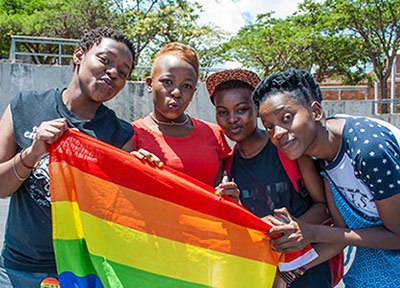Behind South Africa’s reluctance to champion gay rights on the continent

LGBT Pride events are common in South Africa, but not on the rest of the continent.
This article originally appeared in The Conversation.
South Africa is, in some ways, the exception to the generally grim situation facing the estimated 50 million-strong lesbian, gay, bisexual, transgender and intersex (LGBTI) community in Africa.
Its progressive constitution explicitly prohibits discrimination based on sexual orientation. The country’s vibrant civil society includes a broad range of gay advocacy groups.
But South Africa’s stance on gay rights in Africa is opaque. This stands at odds with the increasing global attention Africa has been receiving in the fight against growing homophobia on the continent
A rare positive development was the recent decriminalisation of homosexuality in Mozambique, showing that progress is possible.
A few weeks earlier, scientists from South Africa and Uganda produced research demonstrating that the rationale for repressive laws on the continent are baseless and pernicious. The study found that homosexuality is a normal sexual orientation and that criminalising it can have negative repercussions across society.
The report conclusively demonstrated that LGBTI lifestyles pose no threat. In particular, it dispelled the notion that homosexuals are more likely to engage in paedophiliac behaviour.
South Africa blows hot and cold
In 2011, South Africa bravely led on gay rights issues by introducing a resolution to the UN Human Rights Council that called for equal rights for all, regardless of sexual orientation.
Yet less than three years later it was reticent about a follow on resolution calling for countries to report on LGBTI violations. South Africa’s position was still in doubt as the vote neared in September 2014. Graeme Reid of Human Rights Watch described South Africa’s foreign policy on gay rights as “at best inconsistent and at worst obstructionist”.
Though South Africa supported the resolution at the last minute, its commitment to gay rights appeared less than absolute. The country’s lack of follow-through on its long-standing promise to hold a seminar on African gay rights is further evidence of an increasingly equivocal position.
Reluctance to lead in Africa
South Africa’s uncertainty on if, and how, it should promote gay rights in Africa stems from two primary sources.
Firstly, its progressive domestic policy on gay rights rests on a weak foundation.
A 2013 survey by the Pew Research Centre found that over 60% of South Africans believe that society should not accept homosexuality. This indicates that societal norms lag far behind South Africa’s progressive constitution. In 2006 Jacob Zuma commented that same-sex marriage was a “disgrace to the nation and to God.” He is now the president.
When a member of the main opposition Democratic Alliance read out a statement condemning Uganda’s anti-homosexuality legislation last year, she was heckled by MPs from the ruling African National Congress. With many leaders issuing either derogatory or dismissive statements regarding LGBTI rights, South African society is still looking to be led.
Secondly, South Africa’s tentative policy on gay rights on the continent is also the result of a general reluctance to take a position at odds with the majority of the African states. For example, the late President Nelson Mandela was isolated on the continent when he spoke out against the Nigerian leader Sani Abacha’s execution of Ogoni activists in 1995.
Chastened by this experience, South African foreign policy officials have been hesitant to engage in what they refer to as “megaphone diplomacy.” The foreign minister Maite Nkoana-Mashabane says South Africa will handle the issue of LGBTI rights through “constructive dialogue bilaterally and within the context of the work of the African Union,” rather than by publicly “naming and shaming” violators of gay rights.
The South African government’s dichotomy between “megaphone diplomacy” and “constructive dialogue” is an overly crude binary distinction that excuses a lack of more creative and nuanced diplomacy.
Opportunity to reclaim leadership
South Africa is well positioned to defend the continent’s gay citizens because it is an African state that cannot be accused of importing western values. It, not any western country, was the first state in the world to enshrine the protection of gay rights in its constitution.
South African diplomats should harness the momentum generated by the research report and finally hold the meeting on LGBTI rights in Africa.
By clearly and consistently advocating for gay rights, South Africa will achieve several worthwhile objectives.
It will assist LGBTI Africans who are persecuted for their sexual preference and it can shed light on the public health and societal risks that accompany this persecution. And by protecting gay rights South Africa will more fully and truly live up to its core constitutional principles.
South Africa may yet land on the wrong side of some of its African neighbours on this issue, but if it adheres to its founding values it will surely be on the right side of history.
This article is part of a series The Conversation Africa has compiled on issues related to LGBTI people in Africa. You can read the rest here.
South Africans are quite a hideous nation much like the rest of Africa -one wonders when they will cease oozing out of the sewerage pipes.